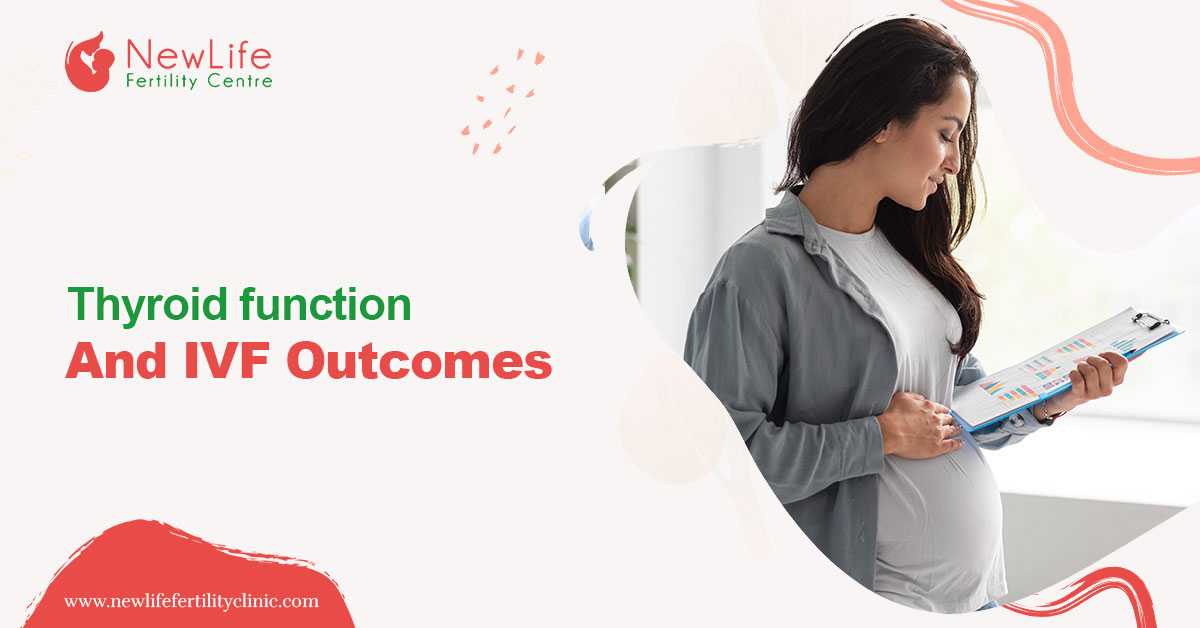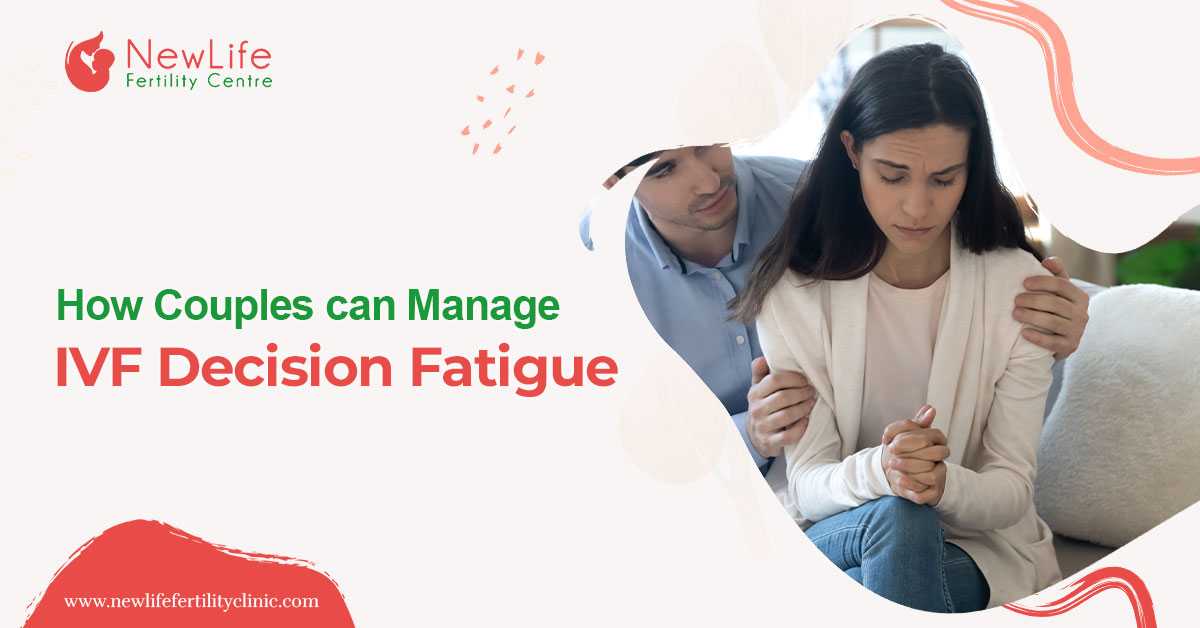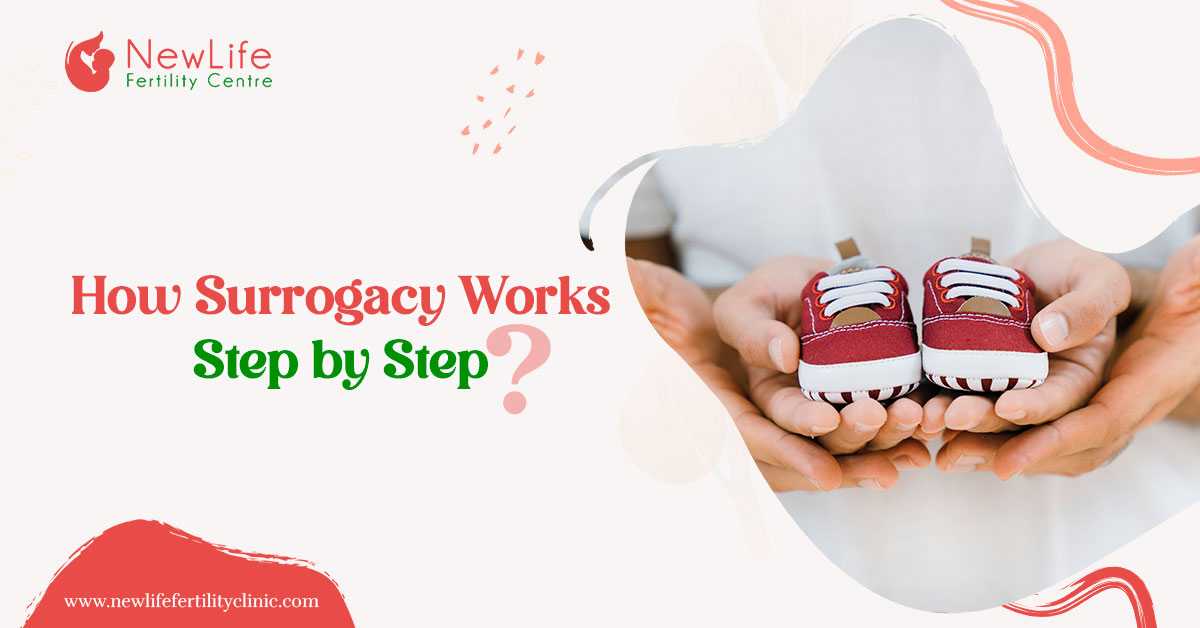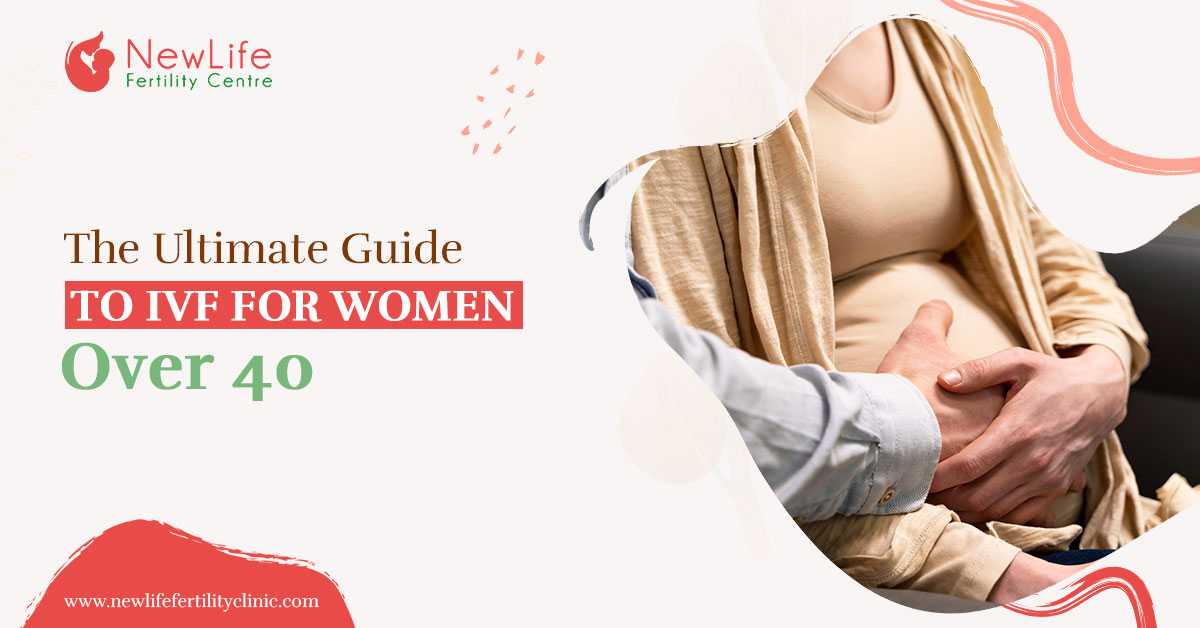1. Introduction: Understanding IVF After 40
Naturally, women's chances of becoming pregnant decline with age, especially after the age of 40. As a woman ages, her ability to produce eggs naturally decreases, both in terms of quantity and quality. A woman's fertility rate is much lower by the time she is 40 than it was in her 20s and early 30s, and problems like irregular ovulation or decreased ovarian reserve are more common. This makes it difficult for many women over 40 to conceive on their own.
Why is IVF a leading option for women in this age group?
In this regard, IVF for women over 40 has become a popular reproductive treatment. Through the process of in-vitro fertilization, or IVF, the ovaries are stimulated to produce a number of eggs, which are then extracted, and fertilized in a laboratory, and the resulting embryos are inserted into the uterus. Using fertility medications, cutting-edge methods like genetic screening, and occasionally donor eggs, IVF gives women over 40 the opportunity to get around some of the problems associated with aging eggs.
IVF after 40 is a viable and empowering option for many women who want to have children later in life, despite certain challenges. The rates of success are rising with the correct medical assistance, giving women who are aiming to become parents after 40 a fresh start. You can understand the IVF procedure, success rates, and crucial advice for women starting this life-altering journey through this elaborate guide.
2. Why Fertility Declines After 40: The Biological Clock
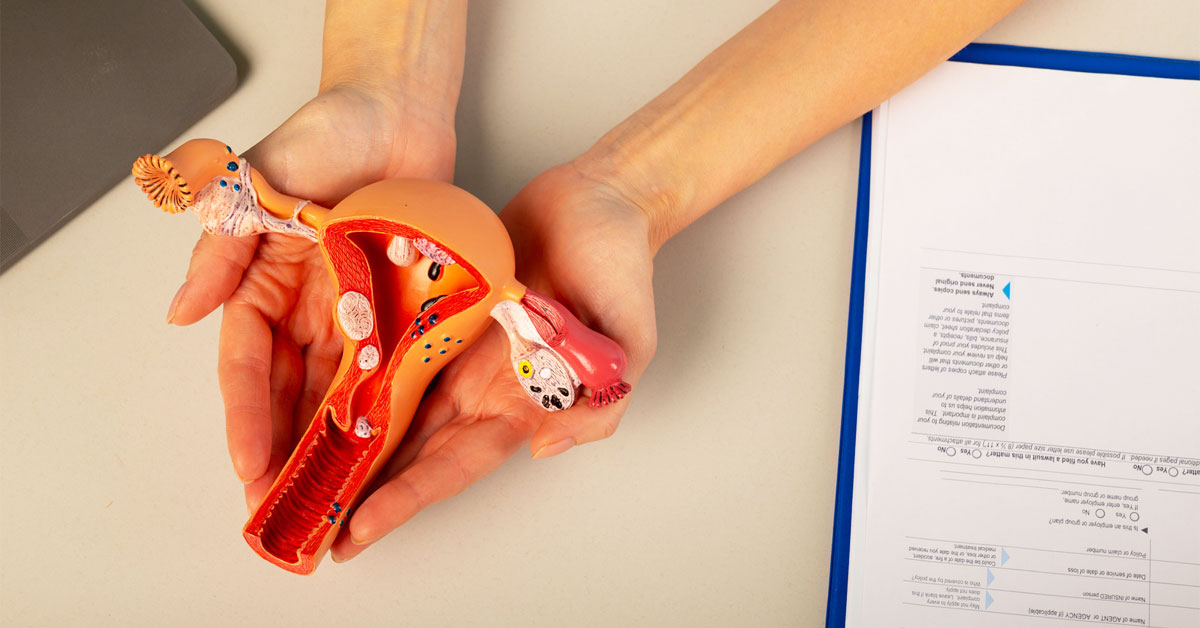
As a woman ages, her fertility naturally decreases, with the biggest reductions happening after the age of 40. The quantity and quality of eggs are the two main causes of this fertility reduction.
Egg Quantity: Ovarian reserve and its significance
A woman has a limited quantity of eggs at birth, and as she ages, her egg count declines. The ovarian reserve, or the quantity of eggs available for fertilization, has drastically decreased by the time a woman reaches her 40s. Egg quality after 40 is greatly reduced and many of which may not be viable, whereas younger women may have thousands of viable eggs.
Doctors frequently use tests such as AMH (Anti-Müllerian Hormone) levels and an ultrasound to quantify the size of the ovaries and the number of follicles in advanced maternal age IVF to evaluate a woman's ovarian reserve.
Egg Quality: Chromosomal abnormalities in eggs and their impact on conception
Fertility is also significantly influenced by the quality of the egg. There are fewer healthy eggs available for fertilization as women age. The higher risk of chromosomal abnormalities, such as Down syndrome or other genetic diseases, in older eggs is one of the biggest problems.
Fertility experts frequently advise methods such as pre-implantation genetic screening (PGS) to evaluate the chromosomal health of embryos before implantation in IVF for women over 40.
Hormonal Changes: Reduced levels of estrogen and progesterone
Along with egg quality after 40, hormonal changes can also be declined which can interfere with your fertility rates. This mainly happens when the natural production of progesterone and estrogen reduces.
These lower levels of hormone disrupt egg maturation and natural menstrual cycle. These side effects not only reduce the chances of natural conception after 40 but also make it difficult to conceive with fertility treatments such as IVF.
Uterine Environment: Age-related changes that affect implantation
The age-related changes in reproductive health also affect the uterine environment which can interfere with implantation. This mainly happens due to the decreased blood flow and thinner uterine lining which ultimately affects the ability of the embryo to implant.
When hormone changes and decreased uterine receptivity combine, successful implantation of embryo and pregnancy with IVF becomes extremely challenging.
3. IVF Success Rates After 40: What You Need to Know
The rates of successful conception with IVF decrease as women age. Fertility treatment such as IVF is definitely a hope for infertile patients but embryo quality, age, and medical conditions are certain factors that determine its success.
Statistics: Success rates by age
The IVF success rates for older women hugely drop with age. Some of the statistics about success rates of IVF for different age groups are mentioned below:
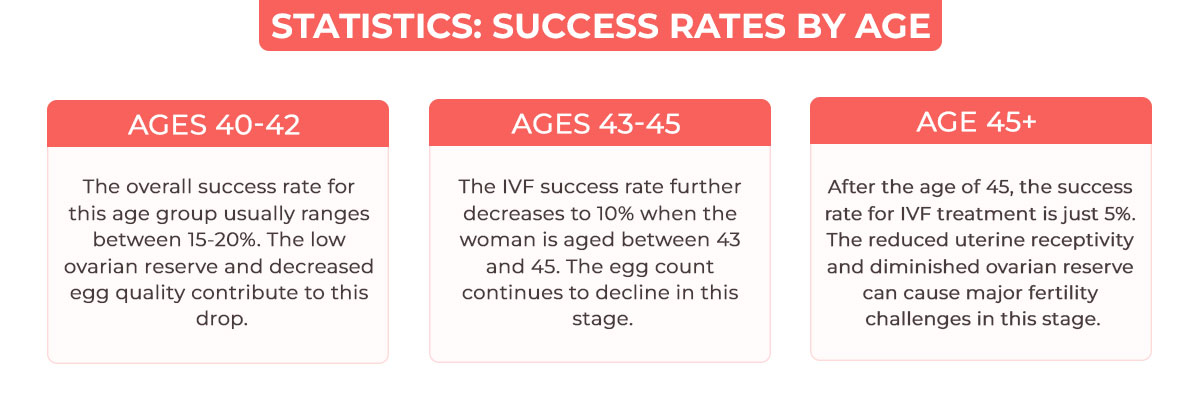
Comparing success rates for own eggs vs. donor eggs
The IVF after 40 success rates reduces hugely and if you want to overcome this issue and attain a healthy pregnancy then you can choose to use donor eggs instead of your own. When a woman uses donor eggs, the success rates of IVF can increase to around 50% from just 20%. Even after the age of 45, the success rate remains 50% where the chances of pregnancy with one's own eggs are just 5%. This mainly happens because along with age, the quality of the eggs plays a major role in IVF success.
Factors influencing IVF success
There are various factors that can influence IVF success rates for older women, are suggested by our IVF Experts at New Life Fertility Center which include-
- Embryo Quality: One of the main factors that contribute to a successful implantation and pregnancy is embryo quality. However, as you age your embryo quality decreases which enhances the risk of implantation failure and chromosomal abnormalities.
- Age: Age is another crucial factor for IVF success. Low egg quality, reduced ovarian reserve, and old age of the woman can hugely disrupt IVF success rates.
- Medical Conditions: The overall reproductive health of the woman also needs to be considered while determining IVF success. If you’re suffering from PCOS, endometriosis, miscarriage history, or fibroids then you have low success rates.
4. Choosing the Right IVF Protocol for Women Over 40
The IVF process needs to be planned carefully with personalized treatment protocols for older women, which will improve IVF success.
Tailored Protocols: Adjustments to ovarian stimulation for advanced age
For advanced maternal age IVF, the infertility experts will make adjustments in the ovarian stimulation process. The main aim of these adjustments is to make the ovaries stimulated enough to produce multiple eggs while reducing the risk of overstimulation.
In most cases, low doses of hormones are prescribed for older women as they help prevent the likelihood of ovarian hyperstimulation syndrome (OHSS). Hormone levels, response to the treatment, and ovarian reserve are checked to determine the right dosage for hormones.
Mild Stimulation vs. Standard Protocols: When less is more
A mild stimulation protocol is adopted by doctors for women above 40. As compared to standard stimulation protocol, this mild stimulation can be effective for older age groups.
This helps in stimulating the ovaries gently with low-dose hormones that result in the production of less but high-quality eggs. This approach is mainly adopted for women with low ovarian reserve as it helps minimize the side effects associated with high hormone dosage.
Natural Cycle IVF: For women with very low ovarian reserve
A natural cycle of IVF for older women is recommended for those who have low ovarian reserve. This process can contribute to alleviating the usage of ovarian stimulation where the doctors rely upon the natural cycle for the production of mature eggs.
It is true that this natural cycle has low success rates as compared to conventional IVF but it can be beneficial for those who have extremely diminished ovarian reserve. Low chances of OHSS and good-quality eggs are the other advantages of a natural cycle.
The Role of a Specialist: Importance of expertise in handling older patients
Another critical factor that can help boost IVF success rates for women above 40 is choosing the right and experienced infertility specialist. An experienced IVF doctor in Siliguri can treat older patients effectively while recommending a tailored treatment protocol based on ovarian reserve, overall health, and fertility history.
An expert can also help older women manage their expectations regarding IVF success and provide personalized care to guide them throughout the IVF treatment. Starting from nutritional support and lifestyle changes to additional therapies, they can recommend the best course of action.
5. Enhancing IVF Success Rates After 40
It can be quite challenging for women above 40 to attain a successful pregnancy with IVF. There can be various age-related challenges that a woman may face which include hormonal changes, diminished egg quality, and uterine issues. Some such tips to improve IVF success include-
Egg and Embryo Quality
IVF outcomes are greatly influenced by the quality of the eggs and embryo. There are various steps to enhance your egg quality, which are-
- CoQ10 supplements: CoQ10 or coenzyme is an essential antioxidant that helps in cellular energy production. Taking this supplement can be beneficial to improve your egg quality while increasing the chances of implantation success.
- DHEA supplements: Another supplement that you can take to enhance egg and embryo quality is DHEA or Dehydroepiandrosterone. This supplement contributes to improving overall ovarian function among women after 40.
- Preimplantation Genetic Testing (PGT): The chances of chromosomal abnormalities are higher among older women and to check that, doctors recommend PGT before implantation. This test can help determine the risks of chromosomal disorders such as Down syndrome. With the help of PGT, only genetically perfect embryos are implanted for a successful pregnancy.
Optimizing Health
The IVF success rates can also be improved by prioritizing your overall health. Improving your physical well-being can be one of the most effective IVF after 40 tips for successful pregnancy.
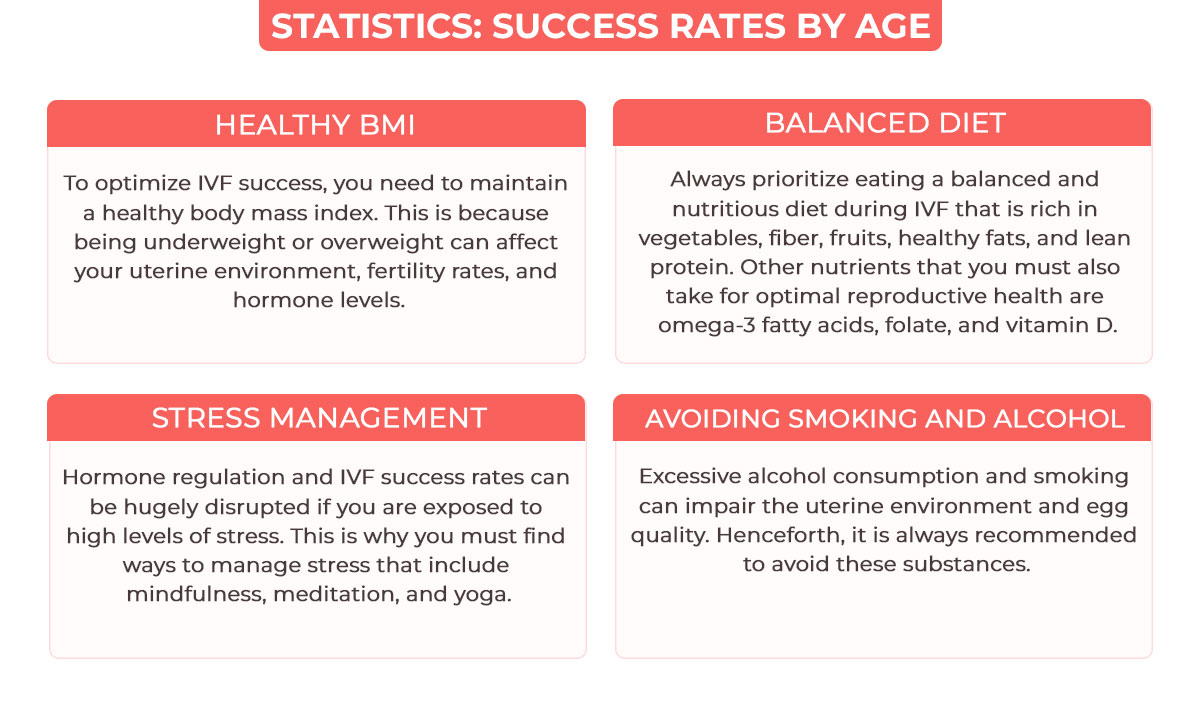
Technology and Add-Ons
There are various technological advancements in IVF treatment that can contribute to increasing IVF success rates, especially among women who are above 40. Using these tools during IVF can be the major tips to improve IVF success-
- Time-lapse imaging for embryo monitoring: This technology helps in monitoring the embryos continuously during development. Herein, the embryologists can select the most viable embryos by observing each and every detail of the embryos. The chances of selecting top-graded embryos and increasing IVF success can be attained with time-lapse imaging.
- Assisted hatching for implantation support: Another technique that can be used to improve IVF success is assisted hatching. This advanced technology helps in breaking the zone pellucida of the egg during implantation. This is an important step as most elderly women have thicker zona pellucida which interferes with the implantation process.
6. Exploring Donor Eggs: A Popular Option for Women Over 40
IVF with donor eggs can be considered an effective measure and effective fertility treatment for women over 40. This viable option enhances your likelihood of a successful pregnancy.
When to Consider Donor Eggs
Recurrent IVF failures and low ovarian reserve are the two main factors when women after 40 opt for donor eggs. This is because, as women age both the quality and quantity of the eggs reduce. When a woman reaches their 40s, only a few viable eggs are left in the ovaries and the remaining eggs also have a higher chance of chromosomal abnormalities. This signifies the benefits of choosing donor eggs IVF over 40 aged women which will ensure successful development of the embryo and pregnancy.
Additionally, women who have experienced recurrent IVF failures can use donor eggs for a successful pregnancy. This is because donor eggs are from younger women who have high-quality eggs which makes the success rates higher.
Process of Donor Egg IVF
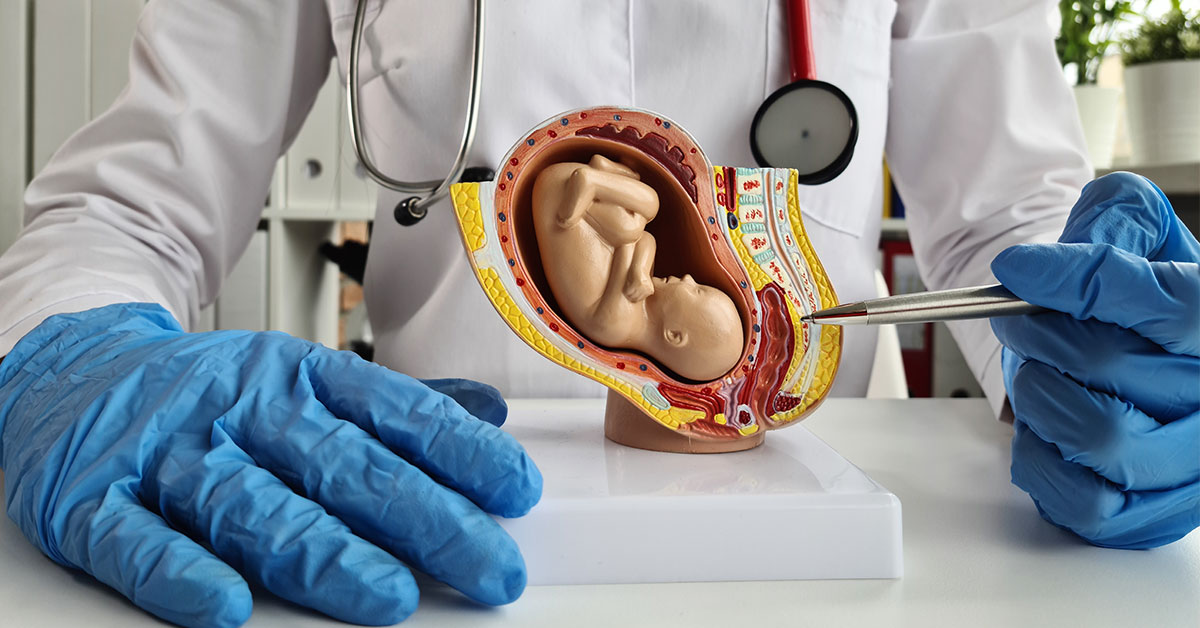
The various stages involved in donor egg IVF are-
- Screening: A thorough screening is done while selecting the donor. In most cases, the donors are healthy and young and need to undergo various tests such as hormone screening, genetic testing, and tests for infectious diseases.
- Fertilization: After selecting a donor, the eggs are then fertilized with the sperm from the recipient with the help of ICSI or conventional IVF procedure.
- Transfer stages: Once the eggs have been cultured for various days, the top-quality embryos are selected for transfer into the uterus of the recipient. Before transfer, hormone therapy is advised to the recipient to develop an ideal uterine environment for a successful implantation.
Emotional and Psychological Impact
Despite the higher donor egg success rates, it still can have a significant psychological and emotional impact on the women who are receiving the donor eggs.
In most cases, there can be feelings of grief, identity concerns, and guilt associated with the hope that it would have been better if they had conceived with their own eggs. It is vital for you to recognize using donor eggs doesn’t reduce your emotional bond with the child.
Importance of counseling and support
Due to the psychological and emotional challenges associated with donor eggs IVF, it becomes essential for women to undergo counselling sessions and seek support from experts. Fertility experts and counsellors can help women manage their feelings, address concerns about genetics and identity, and also handle expectations. Herein, you can also consider joining support groups where you can communicate with people who have undergone similar life experiences.
Once you have understood the donor egg success rates, you must consider partnering with a reputed fertility clinic so that the complex emotions can be managed effectively.
7. Costs of IVF for Women Over 40: What to Expect
IVF is not only a complex but also a costly procedure and especially for women above 40, the rates are quite higher because of the specialized treatments. This is why it is essential to check the breakdown of IVF costs for women over 40 so that you can financially manage the procedure effectively.
Breakdown of costs:
- Testing: Before starting the IVF cycle, the doctor will advise various fertility tests that may cost around Rs 5,000 to Rs 10,000. These testing charges can depend upon the tests you need and the clinic.
- Medications: During an IVF cycle, you need to stimulate your ovaries for the production of several eggs. This stimulation process may involve various medications whose cost can range between Rs 60,000 and Rs 70,000.
- Cycles: The base for an IVF cycle for women over 40 may range between ₹1, 10,000 to ₹3, 00,000. This rate covers everything from egg retrieval to embryo transfer.
- Advanced treatments: In some cases, aged women need advanced treatments such as ICSI, PGT, and embryo freezing. The basic cost for ICSI can be between 2.1 and 2.6 lakh. Additionally, PGT can be around INR 1,200 to INR 2,500 and the cost for embryo freezing is Rs. 10k per month or Rs. 1 lakh yearly.
Additional costs:
- Donor eggs: Donor eggs are a viable option for aged women to ensure a healthy pregnancy. The cost for donor eggs can start from Rs. 2.5 lakhs but the cost can depend on the procedures and the clinic.
- Embryo freezing: Some women may want to freeze their embryos for future usage and this can lead to an additional cost. The typical cost for cryopreservation can start from Rs. 10k per month.
- Genetic testing: Genetic testing is another additional procedure that can increase the total cost of IVF treatment, which can be around Rs. 2000.
Financial tips:
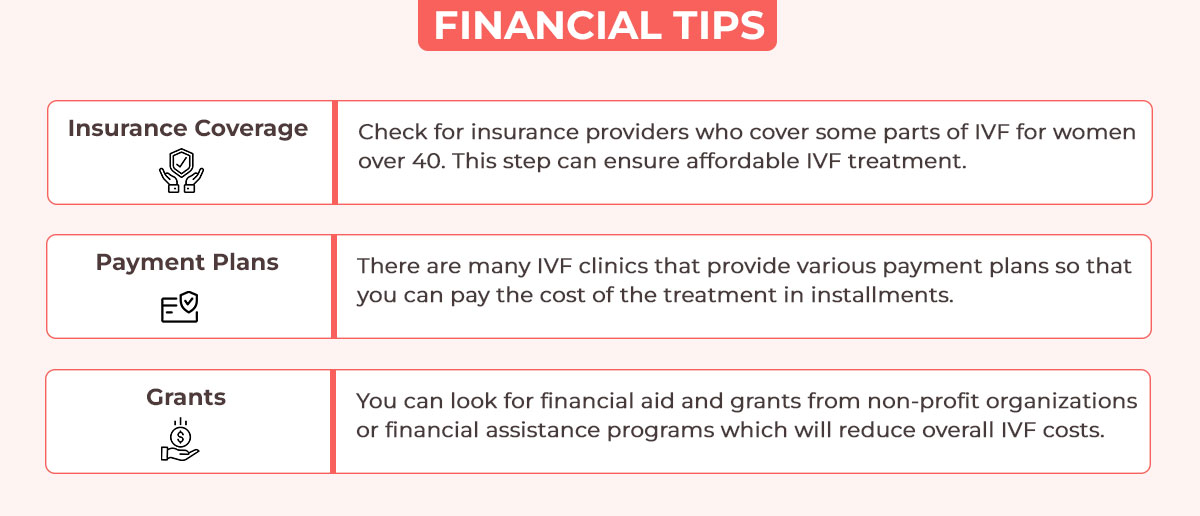
8. Common Challenges of IVF for Women Over 40
IVF gives hope to many women over 40 who wish to become parents but it also presents certain challenges. Some such issues include-
Biological Factors: Reduced egg quality and uterine receptivity.
Decreased egg quality is one of the biggest IVF for women over 40 challenges. It becomes more difficult to create healthy embryos as women age because their eggs become fewer and of poor quality.
Furthermore, as women age, the uterine environment may become less responsive. The uterine lining, which is essential for the successful implantation of embryos, may weaken and lose its reactivity to the hormonal cues required for implantation.
Health Risks: Preeclampsia, gestational diabetes, and caesarean delivery.
Age-related IVF risks for older women also increase, particularly for women over 40. An increased risk of preeclampsia, gestational diabetes, and other problems is linked to pregnancies in older women.
The risk of gestational diabetes, which can result in issues like increased birth weight and a higher chance of requiring a caesarean delivery, is also increased for older women. This is because older mothers are more likely to experience labor difficulties including failure to progress or fetal distress, and caesarean procedures are more common among them.
Emotional Struggles: Dealing with failed cycles and societal pressure.
For women over 40, IVF might provide serious emotional difficulties. Older women frequently devote a significant amount of time, energy, and money to the procedure, where the emotional toll of unsuccessful IVF rounds can be especially severe.
Women over 40 may also experience social pressure over their choice to have children later in life. Other people may judge you, whether it's because you're an older mother or because you're worried about the baby's health. Together with the emotional difficulties of IVF, these outside factors can exacerbate stress, anxiety, and self-doubt.
Cycle Efficiency: Why older women often require more cycles for success.
It is a fact that older women may need more cycles to have a healthy pregnancy presents another difficulty for IVF for women over 40. Older women may not produce as many eggs per cycle, and those eggs may not fertilize or grow into high-quality embryos because of their decreased ovarian reserve and decreased egg quality.
Additionally, even when donor eggs are used, IVF success rates decrease as women get older. IVF for older women may still need patience and financial investment, even if donor egg IVF can greatly raise the chances of IVF success.
9. Navigating Emotional Well-Being During IVF After 40
IVF after age 40 can be emotionally and physically exhausting. For older women, the emotional rollercoaster can be particularly difficult, ranging from the thrill of beginning treatment to the disappointment of unsuccessful cycles.
Support Systems: Building a strong network of professionals, friends, and family.
A strong support network is essential for coping with the psychological effects and getting proper emotional support during IVF. Be in the company of friends, family, and experts who can provide both practical and emotional support. While loved ones might offer consolation and support, it's also crucial to think about consulting a fertility counsellor or therapist.
Fertility counselors follow proper IVF counseling tips and can offer coping mechanisms for handling setbacks and assist you in processing the range of complicated emotions associated with IVF after 40. Online or in-person support groups are also quite helpful since they let you connect with people who are going through similar experiences. These strategies can foster a sense of community and lessen feelings of loneliness.
Coping Mechanisms:
It's crucial to figure out how to handle the emotional highs and lows of IVF.
- Meditation: You can stay grounded and manage stress by engaging in meditation. The success of treatment may be hampered by anxiety, which can be lessened by setting aside a short period of time each day to concentrate on your breathing and clear your thoughts.
- Therapy: Another helpful strategy for maintaining mental well-being is therapy. It might be safe to explore challenging feelings like fear, rage, or disappointment when you work with a therapist. You can learn useful coping mechanisms in therapy to manage the stress and anxiety that frequently come with IVF treatment.
- Journaling: Keeping a journal throughout IVF is an easy yet effective approach to monitor your feelings and ideas. Clarity, processing of your experiences, and emotional release when required can all be achieved by putting your feelings in writing.
Partner Communication: Navigating emotional highs and lows as a team.
It's important to keep lines of communication open with your partner which is another effective way to ensure emotional support during IVF. There will be emotional highs and lows for you both, and navigating the path together depends on your ability to communicate your feelings honestly. Relationships may suffer as a result of IVF, especially if there are unsuccessful cycles or other setbacks.
You should avoid miscommunications and reduce the stress of feeling alone in your experiences by scheduling frequent check-ins with your partner to talk about how you're feeling, both physically and emotionally. Working as a team during IVF will improve your relationship by giving you both emotional support and a common dedication to the procedure.
10. FAQs
Can I use my own eggs for IVF after 40?
Yes! You can use your own eggs to get pregnant with IVF after the age of 40. However, the chances are reasonably low as compared to younger women. This mainly happens due to declined ovarian reserve and quality. To increase your IVF success rates, you can always opt for high-quality donor eggs that can increase the chances of a healthy pregnancy to 50%.
How many IVF cycles does it typically take for women over 40?
In most cases, women undergoing IVF after 40 require more than 1 cycle to get pregnant. However, the total number of cycles needed depends upon various factors that include ovarian reserve, egg quality, additional treatments, and overall health condition. This is why if you’re undergoing advanced maternal age IVF then be prepared for multiple attempts.
Are there increased risks with pregnancy after IVF at this age?
Yes! There’s a slightly increased chance of complications with pregnancy after the age of 40. There are various conditions that you can develop such as miscarriage, multiple gestation, preeclampsia, gestational diabetes, and preterm delivery.
Is donor egg IVF the only option for women over 45?
No, donor egg IVF is not the only option for women after the age of 45 but it is often recommended by doctors to increase the chances of pregnancy. This is because, after 45, women have an extremely low ovarian reserve that increases the chances of repeated IVF failures. Due to these age-related complications, you can choose donor eggs. Even if you’re opting for your own eggs for IVF, an intensive and personalized treatment is required. This may include multiple IVF cycles and high doses of ovarian stimulation drugs for a successful IVF cycle.
11. Conclusion: IVF as a Path to Parenthood After 40
For many women who dream of becoming moms later in life, IVF after 40 offers hope and a successful route to parenthood. Even if the procedure has its own set of challenges, including reduced egg quality, health issues, and the likely requirement for several IVF cycles, improvements in fertility treatments and individualized care have made it easier for older women to fulfil their desire to become parents.
IVF using donor or own eggs, customized IVF procedures to increase success, and genetic testing to increase the likelihood of a healthy pregnancy are some of the IVF for older women solutions. Many women have successfully had IVF and given birth to healthy children, despite the fact that the process may call for patience and emotional support.
It is essential to speak with a fertility specialist if you are over 40 and thinking about IVF. They can help you understand your options, evaluate your unique health conditions, and develop a customized treatment plan. IVF for older women can offer a route to realizing your wish of becoming parents with the correct medical assistance.
Now is the time to begin your IVF journey. Speak with a fertility expert to understand your options and ensure a successful way towards parenthood.
Comments (0)

